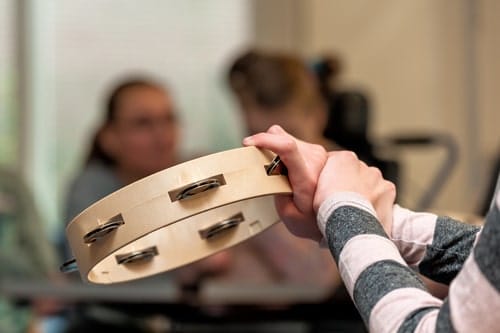Carl Jung, the psychiatrist who founded analytical psychology said, “Music should be an essential part of every analysis.” He was right. Music therapy is an effective treatment for people who have a mental illness, including affective, cognitive, and communicative needs. Results of research and clinical experiences demonstrate the success of music therapy, even in individuals who were resistant to other treatment methods.
6 Proven Benefits Of Music Therapy
- Music therapy reduces anxiety and the physical effects of stress.
- Music therapy improves healing.
- It helps manage Parkinson’s and Alzheimer’s disease.
- It reduces depression and other symptoms in the elderly.
- Music therapy helps reduce the symptoms of psychological disorders including schizophrenia.
- It helps improve self-expression and communication.
What Is Music Therapy?
 Music therapy is the clinical and evidence-based (has proved to be an effective technique) use of musical involvement within a therapy program. Music therapy is a recognized health service similar to occupational therapy and physical therapy. It includes using music as a treatment to address:
Music therapy is the clinical and evidence-based (has proved to be an effective technique) use of musical involvement within a therapy program. Music therapy is a recognized health service similar to occupational therapy and physical therapy. It includes using music as a treatment to address:
- Physical
- Psychological
- Cognitive (the ability to process and understand information), and
- Social functioning for patients of all ages.
Music therapy programs are based on individual assessment, treatment planning, and continuous program evaluation. Music therapists are frequently members of a team and help implement programs for people that have many needs, from anxiety reduction to deeper self-understanding.
What You Can Achieve In Music Therapy
In this type of therapy, the music therapist works with a collaborative team to evaluate the patients:
- Emotional well-being
- Physical health
- social functioning
- Communication abilities
- Cognitive skills through musical responses
When individualized music experiences are designed by the music therapist to fit the individual’s functional abilities and needs, the responses might be immediate and very obvious. Patients don’t need to have a musical background to benefit from music therapy.
Treatment Opportunities
Music therapy treatment provides opportunities to:
- Explore personal feelings
- Investigate issues such as self-esteem or personal insight
- Make positive changes in mood and emotional conditions
- Have a feeling of control over life through successful experiences
- Improve awareness of self and environment
- Express oneself verbally and non-verbally
- Develop coping and relaxation skills
- Support healthy thoughts and feelings
- Improve problem-solving and reality testing skills
- Interact socially with others
- Develop independence and decision making skills
- Improve concentration and attention span
- Adopt positive forms of behavior
- Resolve conflicts leading to stronger family and peer relationships
How Does Music Therapy Work?
In music therapy, the therapist uses music strategies, both vocal and instrumental. These strategies are designed to promote changes that are non-musical. Music selections and active music-making are changed to fit patient preferences and individualized needs (song selection and music may vary). There are 4 major interventions involved in music therapy. They are:
-
Lyric Analysis
Although talk therapy allows a person to talk about topics that might be hard to discuss, lyric analysis introduces a less threatening method to process emotions, thoughts, and experiences. An individual in music therapy is encouraged to offer:
- Insight
- Alternative lyrics
- Definite tools or themes from lyrics that can apply to difficulties in their life and treatment
Everybody has a song that they connect to deeply and appreciate. The lyric analysis provides an opportunity for a person to identify song lyrics that might relate to their experience.
-
Improvisation Music Playing
Playing instruments can encourage:
- emotional expression,
- socialization, and
- exploring treatment themes such as:
- Conflict
- Communication
- Grief
 For example, a therapy group could create a “storm” by playing drums, thunder tubes, rain sticks, and other percussion instruments. They can point out areas of escalation and de-escalation in the improvisation. And they can relate the “highs and lows” of the storm to certain feelings they may have. This sets up an opportunity for the group to further discuss their feelings.
For example, a therapy group could create a “storm” by playing drums, thunder tubes, rain sticks, and other percussion instruments. They can point out areas of escalation and de-escalation in the improvisation. And they can relate the “highs and lows” of the storm to certain feelings they may have. This sets up an opportunity for the group to further discuss their feelings.
-
Active Music Listening
Music can also be used to regulate mood. Due to its rhythmic and repetitive features, music involves the neocortex of the brain, which calms us and reduces impulsiveness. People often use music to match or alter their moods. It can also possibly keep us stuck in a depressive, angry, or anxious mood. To change mood states, a music therapist can play music to match the current mood of the person and then slowly shift to a more calm or positive condition.
-
Songwriting
Songwriting offers opportunities for expression in a positive and rewarding way. Anyone can create lyrics that express their own thoughts and experiences and choose instruments and sounds that best reflect the emotion behind the lyrics. This process can help with building self-worth and be very supportive. This intervention can help instill a sense of pride, as the individual listens to their own creation.
What Mental Disorders Can Music Therapy Help?
Music therapy can help with the following disorders:
-
Mood And Anxiety Disorders
Many studies suggest that music therapy can reduce feelings of anxiety, including in patients with cancer. Music can reduce blood pressure and the heartbeat which can influence how stressed a person feels. Music affects the number of stress hormones, adrenaline, and cortisol, that the body releases, and reducing these hormones can relieve the symptoms of anxiety.
-
ADHD (Attention-Deficit Hyperactivity Disorder)
Music provides structure and structure is soothing to an ADHD brain. Research indicates that pleasurable music increases dopamine in the brain. Dopamine, which is responsible for regulating attention, working memory, and motivation are in low supply in ADHD brains.
-
Autism Spectrum Disorders (ASD)
According to some studies, musical therapy can help improve the overall condition of the patient. Musical therapy in children with autism promotes the development of coordination and motor skill which may make it possible to control the processes of mental inhibition and stimulation.
-
Trauma Disorders (Post-traumatic Stress Disorder and Acute Trauma Disorder)
Music therapy has proved to be an effective technique for working with traumatized children and adults. It offers emotional relief, reduces anxiety, and assists in the progress of life-affirming social interactions. In addition, it enhances feelings of control, confidence, and empowerment which are so needed for individuals suffering from trauma.
Music therapy can have a positive effect on the treatment of schizophrenia. A study showed that music therapy, used along with standard methods of treatment, helps improve the overall condition of the patient, reduced their social isolation, improved their communication skills, and increased their interest in the outside world.
Studies imply that music therapy can improve symptoms of depression. People undergoing music therapy along with standard treatments for depression (such as talk therapy) improved more than people who only took part in talk therapy. Listening to music releases dopamine, a hormone that makes people feel good, and endorphins, hormones that cause happy moods and relieve pain.
-
Obsessive-Compulsive Disorder (OCD)
The effects of music therapy on OCD have been reported. It was noted that when music therapy was added to medication and cognitive behavior therapy it resulted in a more significant improvement of obsessions. Additionally, it provided benefits for the anxiety and depression that often occur with OCD.
Types Of Music Therapy
 Generally speaking, music therapy uses the power of music to interact with human emotions and impact wellbeing, although several types are being used in the world today.
Generally speaking, music therapy uses the power of music to interact with human emotions and impact wellbeing, although several types are being used in the world today.
Bonny Method Of Guided Imagery and Music
Mental imagery is used to help patients with the physical and psychological issues they may be having. The patient focuses on an image to start to think and discuss problems. Music is added to the technique to increase awareness.
Dalcroze Eurhythmics
This technique focuses on rhythm, structure, and movement expression in the learning process. This type of therapy is believed to greatly improve physical awareness, which helps patients with motor skills difficulties.
Kodaly
This method helps to improve the tone of voice, rhythm, and music literacy along with having a positive impact on perceptual abilities, formation of concepts, motor skills, and learning performance.
Neurologic Music Therapy (NMT)
NMT uses the difference between the brain with and without music and influences this to bring about changes in the brain to affect the patient, even outside the field of music. The specialists in this type of therapy claim that the brain changes and develops as a direct consequence of interacting with music. This can help to train motor responses, like tapping the foot to the music, and to develop other related motor skills.
Nordoff-Robbins
The main part of the Nordoff-Robbins method assumes that everyone can find benefits and meaning in music and focuses on music creation with the help of a therapist. This method is practiced widely throughout the world today and can adapt to patients of all experience and ability levels.
So What Outcomes Are Documented In Music Therapy Research?
Documented results of music therapy include:
- Improved self-image
- Increased self-esteem
- Decreased anxiety/agitation
- Increased communication
- Mended interpersonal relationships
- Improved group cohesiveness
- Increased motivation
- Successful and safe emotional release
Sounds like we could all benefit from some music therapy. Like Jimi Hendrix said, “Music is a safe kind of high.”
Treatment For Your Unique Needs at Montare
If you or a loved one are suffering from a mental health disorder, you need to make that first move. Put on some music that moves you and contact Montare Behavioral Health. We will take it from there. Depending on your needs we have Inpatient and Outpatient programs. In addition, Montare has specialized programs created for:
- Seniors
- Young adults
- Women
- College students
- Professionals
- Dual diagnosis (co-occurring mental disorders)
Our experienced medical professionals can devise a comprehensive program meant to address your specific needs and requirements. If you just started feeling like you need help, it is never too early to get help. And if you have been suffering for a while now, it is never too late to reconnect with your life.











